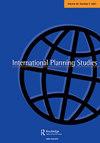老年友好型城市、知识和城市结构调整
IF 1.5
Q4 REGIONAL & URBAN PLANNING
引用次数: 8
摘要
老年友好型城市和社区已成为应对老龄化及其空间效应的一项重要政策、参与性和治理对策。本文认为,它在动员老年人、将年龄问题列入城市议程以及在政治家、政策制定者和项目管理者中获得认可方面具有重要好处。然而,根据贝尔法斯特(英国)的经验,分析表明,需要在更广泛的城市重组过程中理解这一点,房地产经济的重要性,以及规划实践如何有利于特定的群体和发展模式。它利用人口统计数据、政策文件和深入访谈,评估了年龄与城市复兴、基于研究的宣传以及卫生和基于地方的护理中的中央与地方关系之间的关系。论文最后强调了知识在竞争政策领域的重要性,以及关注最受排斥和孤立的老年人以及他们在哪里和如何生活的必要性。本文章由计算机程序翻译,如有差异,请以英文原文为准。
Age-friendly cities, knowledge and urban restructuring
ABSTRACT Age-friendly cities and communities have emerged as a significant policy, participative and governance response to ageing and its spatial effects. This paper argues that it has important benefits in mobilizing older people, placing age on the urban agenda and building recognition across politicians, policy makers and programme managers. Based on the experience of Belfast (UK), the analysis suggests, however, that it needs to be understood within wider urban restructuring processes, the importance of the property economy and how planning practices favour particular groups and modes of development. Drawing on demographic data, policy documents and in-depth interviews, it evaluates the relationship between age and urban regeneration, research-based advocacy and central-local relations in health and place-based care. The paper concludes by highlighting the importance of knowledge in competitive policy arenas and the need to focus on the most excluded and isolated old and where and how they live.
求助全文
通过发布文献求助,成功后即可免费获取论文全文。
去求助
来源期刊

International Planning Studies
REGIONAL & URBAN PLANNING-
CiteScore
4.60
自引率
4.80%
发文量
20
期刊介绍:
Planning, at urban, regional, national and international levels, faces new challenges, notably those related to the growth of globalisation as both an objective socio-economic process and a shift in policy-maker perceptions and modes of analysis. International Planning Studies (IPS) addresses these issues by publishing quality research in a variety of specific fields and from a range of theoretical and normative perspectives, which helps improve understanding of the actual and potential role of planning and planners in this context.
 求助内容:
求助内容: 应助结果提醒方式:
应助结果提醒方式:


